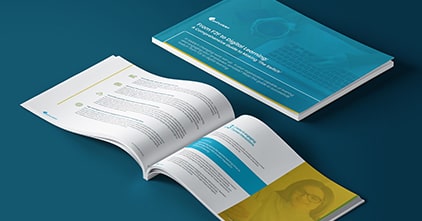Global setting demands more than language fluency. Discover how native English speakers can connect and communicate in English more effectively in a culturally-diverse setting.

When we talk of corporate language training, we immediately think about expanding our skills by learning a second language, one that is different from our native tongue. After all, learning a new language enables you to find growth, confidence, and career advancement. However, there is another side to corporate language training, especially for native English speakers. Have you ever considered revisiting and relearning your native tongue?
With global opportunities opening up nowadays, employees are more likely to become exposed to different co-workers and clients worldwide. For both native and non-native English speakers, learning continues.
Remember that fluency in the English language is not the only measure of business communication skills. What does this mean for native English speakers?
The English Language in a Global Setting
In a talk by global communication specialist Heather Hansen, she provides the numbers. There are 2.4 billion English speakers. Among them, only 400 million are native English speakers. Despite the small number, it may seem advantageous for those who grew up speaking English. But in a group conversation with both non-native and native English speakers, the latter is usually the root of misunderstandings.
“I’ve always found it kind of funny how we try to fit these 2 billion people into this little box with 400 million,” Hansen shares. “Wouldn’t it be a lot easier and a lot more fun to have the 400 million fit into the 2 billion? Numerous studies on global communication have shown that misunderstandings increase when one of the 400 million ‘good English speakers’ enter the conversation.”
Equipped with her experience in speech and communication, Hansen proposes openness and adjustments in using the English language, especially in a global setting.
“What is crucial in global communication is adaptability,” Hansen says. “As a speaker, being able to change the way that you speak so that it is easier for your listeners to understand. And even more importantly, as a listener, being open and flexible to hear all kinds of English, and really making an effort to understand.”

Relearning English for Native English Speakers
While other nationalities adapt by studying English in a professional setting, native English speakers can also make an effort to communicate more effectively. Think about how you can best express yourself to your audience or listener.
Always keep in mind that your goal is to deliver a clear message. It may seem easy, but when you are accustomed to talking and writing in a certain way, some habits hinder you from getting your message across faster and easier.
Below are three tips to help native English speakers adapt and communicate in a global conversation.
Keep your statements short and simple.
Language influences how we think and process information, so it is a priority to be mindful of how we phrase our sentences.
In global communication, use shorter statements without the fluff. Use simpler words over complicated ones. Also, let go of any jargon, slang, and idioms.
Certain words and phrases are difficult to understand for non-native English speakers because these require context on cultural references. A few examples are “catch my drift,” “ride the tide,” and “touch base.”
In addition, contractions and abbreviations may also be a source of confusion. Choose “I would have” over “I would’ve” and “as soon as possible” over “ASAP.” It may seem trivial, but these changes will help lessen the risk of ambiguity.
The next time you draft your email or prepare for a meeting, think about the easiest way to phrase your statements. It will help you save time ironing out miscommunication or explaining further.
Speak slowly and clearly.
When communicating in your native tongue, there is a natural tendency to speak faster. It is not entirely your fault—it is the same for any language.
The familiarity with your native tongue allows you to think and speak at a different pace than you would in a second language.
As a native English speaker communicating in English, be conscious of the speed of your speech in a global setting. This means paying attention to your pace during meetings, discussions, and brainstorming.
Speaking slower helps you to enunciate words clearly. As a result, your listeners can comprehend and process your statements better.
Expose yourself to language training content.
Communicating in a culturally-diverse setting would have been less tricky if there were strict rules on how to write or speak. Unfortunately, there is none. That is why it is imperative to be aware of the different ways you can improve your language and communication skills.
Thankfully, numerous content and courses on language training, multicultural communication, and global English are available online! Such contents do not only help you become more culturally aware but also improve your communication style.
With the mission to provide everyone an equal voice, goFLUENT conducts language training and offers special courses on cross-cultural communication and English for native English speakers. These language courses aim to translate language learning to business communication skills which will help professionals in the workplace.
goFLUENT’s English for Native English Speakers course, for example, helps learners relearn English in a way that is understandable across cultures. It covers topics such as best practices for controlling the rate of speech when presenting to global audiences, simplifying sentence structure and vocabulary, and avoiding abstract language.
Take the initiative to learn how you can express yourself better in a global conversation by taking language training and special courses.

Taking the Next Step in Global Communication
For native English speakers, fluency in the language is not enough. The workplace is rapidly changing. While it is an exciting time for global opportunities and collaboration, it also requires relearning English to communicate effectively.
Make it your goal to be understood by adjusting your communication style depending on your listener. After all, English as a common language should bridge culture, foster collaboration, and enable communication.




